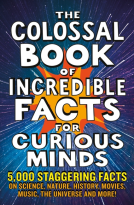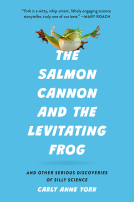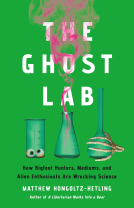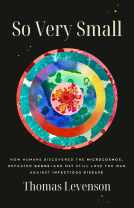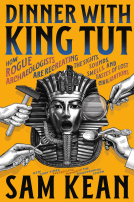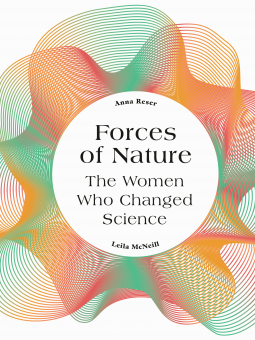
Forces of Nature
The Women who Changed Science
by Anna Reser; Leila McNeill
This title was previously available on NetGalley and is now archived.
Send NetGalley books directly to your Kindle or Kindle app
1
To read on a Kindle or Kindle app, please add kindle@netgalley.com as an approved email address to receive files in your Amazon account. Click here for step-by-step instructions.
2
Also find your Kindle email address within your Amazon account, and enter it here.
Pub Date May 25 2021 | Archive Date May 13 2021
Quarto Publishing Group – White Lion | Frances Lincoln
Talking about this book? Use #ForcesofNature #NetGalley. More hashtag tips!
Description
In the ancient and medieval world, women served as royal physicians and nurses, taught mathematics, studied the stars, and practiced midwifery. As natural philosophers, physicists, anatomists, and botanists, they were central to the great intellectual flourishing of the Scientific Revolution and the Enlightenment. More recently women have been crucially involved in the Manhattan Project, pioneering space missions and much more. Despite their record of illustrious achievements, even today very few women win Nobel Prizes in science.
In this thoroughly researched, authoritative work, you will discover how women have navigated a male-dominated scientific culture – showing themselves to be pioneers and trailblazers, often without any recognition at all. Included in the book are the stories of:
- Hypatia of Alexandria, one of the earliest recorded female mathematicians
- Maria Cunitz who corrected errors in Kepler’s work
- Emmy Noether who discovered fundamental laws of physics
- Vera Rubin one of the most influential astronomers of the twentieth century
- Jocelyn Bell Burnell who helped discover pulsars
Available Editions
| EDITION | Other Format |
| ISBN | 9780711248977 |
| PRICE | $30.00 (USD) |
| PAGES | 272 |
Featured Reviews
I'm a bit conflicted by this book.
On the one hand, it's a pretty great introduction to women in science - and the fact that women have ALWAYS been "in science", they've just been obscured (deliberately or not) on a personal level or an institutional one; by which I mean, "science" has been constructed as a discipline in order to leave the ladies out (eg midwifery isn't really medicine). Recovering the presence of women is always good.
I LOVE that Marie Curie isn't mentioned until the last chapter. Seriously: the authors make this choice an explicit one, explaining that she gets used as the exemplar and that's not useful (and also people ignore a whole bunch of facts about her, too).
I liked that the authors aimed to go back to ancient women, despite the overwhelming lack of evidence (because patriarchy AND because time); they make a good case for ways in which ancient women would have been involved in scientific endeavour.
On the other hand...
I wasn't always sure whether the authors were picking women as examples, or if they thought they were being exhaustive. If the latter, then they didn't succeed - and surely they weren't trying for that in a book intended for the general reading public - but I would have felt more comfortable if they had been clearer about their decision-making paradigms.
There were some sweeping statements about "women" and their access to education/lack thereof. Very occasionally there were comments about how class also interacted with gender - but I felt there was a serious lack of this latter point. Class had a HUGE impact on access to time, let alone equipment; this intersection should have been made much more obvious. As well, other discussions about women's involvement in science has pointed out that gentlemen-scientists, for instance, often had female servants assisting; that's not discussed here.
Occasionally, the authors do not walk the line I think they intend to. For instance, when Western Europe experiences a craze for natural history and botany, the latter in particular is seen as appropriate for women to be involved in, for various reasons. The authors point out that it was thought women were closer to nature, and therefore had an affinity for botany... and then seem to suggest that women really were better at botany? I was a bit confused about what the authors thought they were doing here.
This is, too, an overwhelmingly European (and eventually American, largely still of European descent) book. Not exclusively - there is mention of women in ancient Egypt (of course; that's basically European in the way it's often discussed!), and women medical practitioners in ancient China. There's a Japanese scientist in the 20th century who did awesome things regarding ocean currents and nuclear fallout, a woman of mixed Irish/Mexican ancestry who was an archaeologist, and a few others. I would have liked to see an acknowledgement that evidence is overwhelming white, because colonialism (in Europe and America) and because... lack of access, or something? for Asia. Africa, South America, Australia...
I got whiplash when the discussion leapt from Algoanice, living in probably the first century BCE, to Hildegard, who was born in 1098 CE.
As a way of enlarging your understanding of women's place in science over time, this is a fine place to start, as long as you remember the caveats about class and race.
I enjoyed this book. I found the discussion of the involvement of women in science thorough and illuminating. I also liked the organization of the book. The art in the book is great. But I also had a couple of quibbles with the book. The writing style is more formal than I usually enjoy. I also found the book weak on discussing women in biology and medicine in the 20th century. Overall though, this is a book well worth reading and is a good starting place to learn more about specific accomplishments, such as those available in specific biographies. Thank you to Netgalley and Quarto Publishing Group – White Lion for the advance reader copy.
 Susan B, Reviewer
Susan B, Reviewer
Reser and McNeill's Forces of Nature is a well-written thoughtful and soulful analysis of some of the mostly unsung women who changed science by developing ground-breaking theories and tests in many areas including astronomy, physics, chemistry, paleontology, and biology, many of which are still in use today or which fueled subsequent discoveries. It is not a dry bibliographic run and the layout of the book is excellent with its many photographs of the women. Forces of Nature would be a good advanced placement high school, first year college history of science text book.
Historically, the contributions of women to science have been poorly documented and it's really mainly in recent history that they've been given much more than a mention. So to have a book about women in science is pretty amazing. It's also maddening and sad that what we know of women in science could even begin to fill only just one volume. And yet, the information is so scant as to having to piece together the puzzle of where women would have played their roles.
This volume discusses women in the scientific world from ancient times to the contemporary. Early history is conjecture to a certain degree, based on what we know of the periods of history. This takes into account early female roles in history that have carried on through the ages such as healing and dealing with childbirth. As we reach the 17th-18th centuries, there are more written records of the contributions although much of the acknowledgement of these efforts comes through a male counterpart, be it a mentor, employer or spouse. Women's roles in science started to become more of a separate entity as we came into the 19th and 20th centuries and in modern times women get a lot more credit than at any time in earlier history.
The book is divided into time periods and each era focuses on notable women of the time. There are images of several of these women, in drawings and photograph and some women even get their own pages with mini-biographies. While I like these pages, I was disappointed that most of the information included was repeated from the main text. I would have liked there to be more reason to read these side articles. Although it was pointed out to me that perhaps this was done for those who might skim the book instead of reading it through.
Aside from that note, I will say I was quite pleased with the book and learned quite a bit about women who have played roles that I've not heard about. I see this book as an introduction and jumping point to find more information about these women. I also liked the way the authors had no problem with pointing out some of the negatives of the women involved. So if a woman was remarkable for the science but was racist, it was noted. Privilege was the main factor as to how far a woman might go in making progress in scientific achievement and it was usually through a connection with a mentor, employer, or spouse that much was accomplished.
Although the text is a bit dry at times, it is a lovely book and I give it a solid four stars overall.
I would like to thank Netgalley and White Lion for sharing an advanced reader copy in exchange for a fair review.
 Ana M, Reviewer
Ana M, Reviewer
I received a free e-ARC from the publisher via NetGalley in exchange for an honest review.
Forces of Nature is an absolutely fascinating book exploring the lives of women in science throughout history.
Each section focused on a few women in a particular field, such as astronomy or botany. Not only did the author's provide readers with a biography of each woman, but they also discussed the historical, social, and political context of each woman's life. There were discussions about barriers to women entering scientific fields, but also the reasons they could (for example, if they had wealth.)
I will note that the writing may be considered somewhat more formal and academic than some general audiences would like, but I really enjoyed it.
My only critique is that it was quite Eurocentric, with most examples being pulled from Europe or North America. I would very much enjoy a second volume exploring women from Africa, Asia, Oceana, and South America.
I loved reading about all of these women who forged their own paths in their disciplines. I would recommend to anyone interested in women's history, especially as it relates to the history of science.
 Stephie A, Educator
Stephie A, Educator
As a female science teacher, this book would be a great resource in my classroom to highlight so many amazing women in science. I also love that it doesn't just include current women in science but goes back to ancient times so show that they have always been a part of the story even if that part of the story isn't often told. Highly recommended.
First, I would like to thank NetGalley and the publisher for access to this ARC in exchange for an honest review.
This book is a historical account of the way women have contributed to science throughout history despite the roadblocks that have been put in their way. I really enjoyed this book and the way it presented information. They author says from the beginning that until fairly recently, you had to really drudge through information to find women associated with science because many times, when there were women involve, their work was diminished or they just flat out weren't given any credit. I think this book did a good job of discussing the different intersections of the lives of different women, including race, class, ethnicity, etc. It didn't deify these women; it made sure to showcase the full picture, including the different priviledges many of this women had.
The main drawback from this book is that it is mainly a Western account of women in science. There are a few mentions of women from China, India, and Japan, but other than that, I believe they were all North American or European. There were no mentions of women scientist from Africa, Australia, or South America. While this could be due to lack of information, I think that is something that the author should have mentioned.
I recommend this book to people everywhere who are interested in learning more about women you may have never heard of that have contributed to the knowledge we have access to today.
 Jennifer O, Educator
Jennifer O, Educator
This is a well-researched book that takes a very interesting perspective to find women in science across history. Due to the overall nature of history, women are generally have not been included in the records and this is particularly evident in the usual history of science. This book offers not only the women that have helped build science to what it is today but also accurately portrays the overall history of science in general as well. As a science educator. I would happily use this as a source for teaching the history of science.
Thanks to Netgalley and Quarto Publishing Group – White Lion for a digital copy in exchange for an honest review :)
Forces of Nature sets the record straight and charts the fascinating history of women’s discoveries in science. This is a very interesting non-fiction book. I was very excited for this book for a while! It sounded brilliant and I really wanted to read this! It does not disappoint. I loved it. I have found a lot of information I did not know about. I discovered some interesting, fascinating women and I would like to read more about them. I was mostly interested in the women that taught mathematics and studied the stars - my favorite topics.
Generally, the book is really easy to read. It also has a lot of photos that help you understand more and also give you more information. It is easy to follow and every chapter made me more interested. The book is written chronological from ancient and medieval world to nowadays. This made it even more interesting because it showed how the importance of women in science has developed.
I totally recommend this book to anyone! Great book!
Readers who liked this book also liked:
Nigel Henbest; Simon Brew; Sarah Tomley; Ken Okona-Mensah; Tom Parfitt; Trevor Davies; Chas Newkey-Burden
Entertainment & Pop Culture, Humor & Satire, Nonfiction (Adult)

